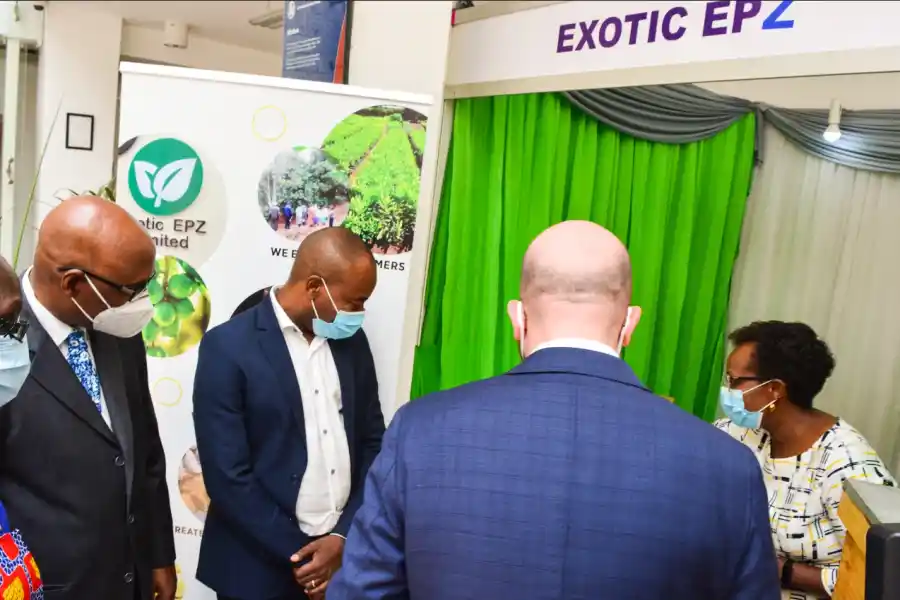This morning, I am thrilled to share some of my findings and shed light on the immense potential for innovation in Africa and its significant role in addressing sustainability and climate change challenges after spending time exploring what individuals and organizations are doing around sustainability and climate action and looking at how we can use some of the cases as a source of inspiration to drive Science, Technology, and Innovation (STI) in our respective areas of business. I was at the University of Nairobi for a viva voce as part of my PhD when a friend mentioned about the 7th edition of the annual Nairobi Innovation Week, an annual event celebrating local and international innovations while enhancing innovation and entrepreneurship ecosystem. This was my motivation; And the examples highlighted in this article illustrate the power of innovation, collaboration, and knowledge exchange in addressing sustainability and climate change challenges.
By embracing the lessons learned from these influential figures and organizations, and by fostering a culture of innovation and collaboration, Africa can unlock its vast potential and lead the way in creating a sustainable and resilient future for all. I believe it is our collective responsibility to support and amplify these efforts, to invest in STI, and to promote the spread of knowledge and innovative thinking throughout Africa. By so doing, we will empower individuals, communities, and nations to build a better tomorrow, where sustainability and climate resilience are at the heart of development.
Together, let us embark on this transformative journey and create a brighter future for Africa and the world. Join me in this journey and feel free to reach out in case you would like to engage in a dialogue geared towards shaping a brighter and more sustainable future for Africa and beyond.
1. Harnessing the power of renewable energy
Like Kenya President Dr. William Samoei Ruto said last week during during a strategic dialogue on the African climate action summit held at the Global Center on Adaptation in Rotterdam, the Netherlands, Africa is blessed with abundant renewable energy sources, including solar, wind, hydro, and geothermal, which have the potential to provide clean and sustainable power to meet the increasing energy demands. The shift towards renewable energy is crucial in mitigating the impacts of climate change, reducing carbon emissions, and moving away from reliance on fossil fuels. Many regions in Africa still suffer from limited access to electricity, and renewable energy presents an opportunity to bridge the energy gap and provide affordable and reliable power to millions of people. Innovations in the field of renewable energy are already transforming the energy landscape in Africa. Solar power, for instance, has seen tremendous growth, with advancements in photovoltaic technology and falling costs of solar panels. Off-grid solar solutions, such as pay-as-you-go systems, have revolutionized access to electricity in remote areas. Furthermore, wind energy projects, such as the Lake Turkana Wind Power project in Kenya, are tapping into Africa’s vast wind resources to provide clean energy on a large scale. Embracing innovative financing models, such as green bonds and impact investment, can also accelerate the deployment of renewable energy infrastructure across the continent. By leveraging these innovations, Africa can transition to a sustainable energy future, reduce greenhouse gas emissions, and drive economic growth.
Read also: Bridging the energy gap in Africa: Lessons from Sierra Leone’s mini-grids sector
Progress in this domain is exemplified by the efforts of Kandeh Yumkella, former Director-General of the United Nations Industrial Development Organization (UNIDO). Yumkella has been a vocal advocate for sustainable energy access and the eradication of energy poverty in Africa. His work on the Sustainable Energy for All initiative has catalyzed the adoption of renewable energy solutions in many African countries. Another notable case in Africa is the company M-KOPA Solar, which operates in East Africa. M-KOPA Solar offers affordable solar energy solutions through a pay-as-you-go model. They provide solar home systems that include solar panels, batteries, and efficient LED lights, allowing households to access clean and reliable electricity. M-KOPA’s innovative financing model enables customers to make small daily payments using mobile money, making solar energy accessible to low-income households. By harnessing solar power, M-KOPA Solar contributes to reducing carbon emissions, improving energy access, and empowering communities in rural areas.
2. Empowering water resource management
Water resource management is critical for ensuring water security, supporting agriculture, and preserving ecosystems in Africa. Climate change exacerbates water scarcity and puts additional pressure on already stressed water resources. Empowering water resource management is essential to address water challenges, enhance resilience, and ensure sustainable development. Innovations in water resource management can focus on various aspects, such as water conservation, efficient irrigation techniques, wastewater treatment, and water reuse. Smart water meters and sensor technologies can enable real-time monitoring and management of water resources, facilitating efficient water distribution and reducing losses. Rainwater harvesting systems and small-scale water storage solutions can help communities capture and store water during the rainy season for use during dry periods. Decentralized wastewater treatment and recycling systems can minimize pollution and provide a sustainable source of water for agriculture and other purposes.
Pioneers in water resource management are finding innovative ways to address this challenge. Professor Amadou Hama Maiga, a renowned hydrologist from Mali, has dedicated his career to water resource management and sustainable development in the Sahel region. His work focuses on improving water governance and empowering communities to manage their water resources effectively. Another example is Kenya Climate Innovation Center (KCIC), has been actively involved in empowering water resource management initiatives. Through collaborations with organizations like DANIDA and the European Union, KCIC has supported projects that promote sustainable water management practices in Africa. By providing technical assistance, funding, and capacity building, they have helped communities and institutions develop innovative solutions to address water scarcity and ensure long-term sustainability.
3. Collaboration and knowledge exchange
Collaboration and knowledge exchange play a pivotal role in addressing complex challenges related to sustainability and climate change in Africa. The need for collaboration arises from the interconnected nature of these issues, which require multi-stakeholder involvement, shared expertise, and collective action. Africa is a continent of diverse ecosystems, cultures, and socioeconomic contexts, and effective collaboration enables the pooling of knowledge, experiences, and resources from various actors to develop context-specific solutions. Innovation in collaboration and knowledge exchange is about creating an ecosystem that promotes open dialogue, knowledge sharing, and mutual learning and can take several forms. Think about establishing regional and international networks and platforms that facilitate dialogue, information sharing, and joint initiatives is crucial. Think about leveraging technological advancements and digital tools that can revolutionize collaboration and knowledge exchange. Also think about fostering collaboration between research institutions, governments, and communities which can enhance the integration of indigenous knowledge systems into scientific research and policy development.
To read: New design is needed to address the climate paradox
The European Union, through its various research and development programs, has been instrumental in promoting cooperation between Africa and Europe in the fields of sustainability and climate change. Initiatives such as Horizon Europe provide opportunities for African researchers and innovators to collaborate with their European counterparts, fostering a dynamic ecosystem of knowledge sharing and innovation. Similarly, organizations like DANIDA have been actively supporting capacity building and knowledge transfer in Africa. By investing in training programs, research grants, and collaborative projects, DANIDA strengthens the continent’s scientific and technological capabilities, enabling African researchers and entrepreneurs to contribute effectively to sustainable development and climate change mitigation.
4. Nurturing agri-Innovation for climate resilience
Agriculture is a vital sector in Africa, supporting livelihoods, ensuring food security, and contributing to economic growth. However, climate change poses significant challenges to agriculture, including erratic rainfall, increased frequency of droughts and floods, and the spread of pests and diseases. Therefore, nurturing agri-innovation for climate resilience is crucial to safeguard food production, enhance farmers’ livelihoods, and build sustainable agricultural systems. Innovation in agriculture can take various forms, from climate-smart farming techniques to the development of drought-tolerant and disease-resistant crop varieties. For example, precision agriculture, which involves using technology like remote sensing, drones, and data analytics, can optimize resource management, minimize inputs, and increase productivity while reducing environmental impacts.
The use of agroecological practices, such as organic farming and agroforestry, can enhance soil health, promote biodiversity, and increase resilience to climate change. Also, digital platforms and mobile applications can provide farmers with real-time weather information, market prices, and access to financial services, empowering them to make informed decisions and improve their productivity. Research and development in agricultural biotechnology can also play a role in developing climate-resilient crop varieties that withstand drought, heat, and pests. By fostering a supportive ecosystem for agri-innovation, including access to finance, training, and technical support, Africa can unlock its agricultural potential, adapt to the impacts of climate change, and ensure sustainable food production for its growing population.
And although climate change poses significant threats to agriculture and food security in Africa, ingenious minds are harnessing the power of technology and innovation to address these challenges. Dr. Akinwumi Adesina, the President of the African Development Bank (AfDB), has spearheaded the Technologies for African Agricultural Transformation (TAAT) program. This initiative promotes the adoption of climate-smart agricultural technologies, empowering smallholder farmers with resilient and sustainable practices. Another example is The Alliance for a Green Revolution in Africa (AGRA), an organization working to promote agri-innovation and climate resilience in Africa. Through their efforts, AGRA empowers farmers, strengthens value chains, and contributes to food security and poverty alleviation in Africa. The private sector has a crucial role to play in driving sustainability and climate change solutions. Companies like Exotic EPZ, based in Kenya, have emerged as leaders in adopting sustainable practices and promoting environmental stewardship. Exotic EPZ specializes in horticulture exports and has implemented various initiatives to minimize their carbon footprint, conserve water resources, and reduce waste. By embracing sustainable business practices, Exotic EPZ sets an example for other companies in the region, demonstrating that economic growth and environmental responsibility can go hand in hand.
5. The need to build a sustainable future
The need to build a sustainable future is imperative for the well-being of our planet and future generations. Climate change, environmental degradation, and social inequities are pressing challenges that require immediate action. Building a sustainable future involves adopting practices and policies that balance economic growth, social development, and environmental protection. The African continent, with its rich natural resources and diverse ecosystems, holds immense promise in tackling the urgent issue of climate change. Innovative solutions in sustainability have become imperative, and visionary leaders are championing the cause. One such figure is Dr. Richard Munang, an environmental scientist and coordinator at the United Nations Environment Programme (UNEP). Dr. Munang has spearheaded initiatives such as the Africa Adaptation Initiative, advocating for climate-resilient development and sustainable practices across the continent. In addition to Dr. Munang, we must recognize the influential work of Dr. Edward Mungai, the CEO of Impact Africa and a partner at KCIC Consulting Ltd (KCL). Dr. Mungai has been at the forefront of promoting sustainable entrepreneurship and fostering climate innovation in Africa. Under his leadership, KCL has supported numerous innovators in developing climate-friendly solutions, providing mentorship, and access to markets. On the other hand, Impact Africa continues to provide sustainability consulting and helping businesses build on the ESG needs across Africa.
Other articles by the same author:

